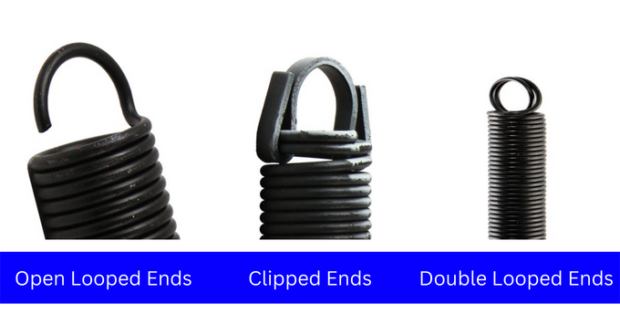Extension springs are responsible for operating your garage door. Working in tandem with your opener, the springs are the muscle behind the scenes. This post answers some common extension spring questions and provide a size chart.
Door Weight Color Spring Code 10 LB White 25-42-10 20 LB Green 24-42-20 30 LB Yellow 25-42-30 40 LB Blue 25-42-20 50 LB Red 25-42-50 60 LB Brown 25-42-60 70 LB Orange 25-42-70 80 LB Gold 25-42-80 90 LB Light Blue 25-42-90 100 LB Tan 25-42-100 110 LB White 25-42-110 120 LB Green 25-42-120 130 LB Yellow 25-42-130 140 LB Blue 25-42-140 150 LB Red 25-42-150 160 LB Brown 25-42-160 170 LB Orange 25-42-170 180 LB Gold 25-42-180 190 LB Light Blue 25-42-190 200 LB Tan 25-42-200 210 LB White 25-42-210 220 LB Green 25-42-220 230 LB Yellow 25-42-230 240 LB Blue 25-42-240 250 LB Red 25-42-250 260 LB Brown 25-42-260 270 LB Orange 25-42-270 280 LB Gold 25-42-280 290 LB Light Blue 25-42-290 300 LB Tan 25-42-300
It’s important to choose the right size and weight for your specific door. Extension spring sizes are based on inside diameter (ID), wire size, and length. The ID is the distance between the coils when the spring is at rest, while the wire size refers to the thickness of the wire used to create the spring. The length can vary depending on the application. Springs with a larger ID, thicker wire, or longer length can support more weight.
Your garage door height and weight determine what type of spring to use. A taller door must have stronger springs, while a wider one requires springs with a larger ID. And, of course, a heavier door will need springs to support more weight. To help you choose the right extension springs for your needs, we’ve created this helpful extension spring size weight chart. Find your door’s specs in the left column, then match them up with the correct spring size in the right column. With this guide, you can confidently choose the right springs for your sectional garage door.
What are extension springs, and how do they work?
Extension springs help to counterbalance the weight of your garage door. They sit above the horizontal tracks on either side of the door and stretch and contract as it moves. Over time, extension springs become worn or damaged, necessitating replacement or conversion to a torsion spring system. Most extension springs are rated for a life expectancy of 10,000 cycles, but they can break sooner depending on usage and weather. A broken extension spring requires a call to a local repair company.
Types of garage door springs
There are two main types of garage door springs – extension springs and torsion springs.
Extension springs used to be the most common type. They are attached to the door at either end, stretching as it opens and closes. Extension springs are also more susceptible to breakage and are more dangerous when they break. Because extension springs are hooked in, the released tension causes the spring to hit the surrounding area when it breaks. Snapped extension springs can break a windshield, dent your car, or gouge a nearby wall.
Torsion springs are wound around a metal shaft and twist as the door opens and closes. Torsion springs are our preferred spring method.
Extension spring ends

Extension spring safety tips
Here are some tips for those with extension springs to keep you safe.
- Follow the manufacturer’s instructions for installing, maintaining, and replacing your extension springs.
- Do not remove any safety devices installed on your garage door or springs.
- Do not attempt to repair or adjust your garage door or springs yourself. If you have any questions about their safety, please get in touch with a professional garage door service company.
- Keep children and pets away from your garage door and spring area when the door is open. They may suffer serious injury if they come into contact with the door or spring while it is in motion.
- Do not try to release the tension on a spring by removing coils. This can cause the spring to snap and cause serious injury. If you need to reduce the tension on a spring, contact a local garage door repair company.
In closing
Replacing garage door springs is not a DIY project, so if you need help, please call us at 817-500-5988 or contact us. Depending on the number and size of springs, converting extension springs to a torsion spring setup costs between $650 and $1000.
The listed springs are one option to outfit your door, but they are not the only way to pair springs with your door. There are hundreds of safe spring combos for each door size and weight.
We do not sell springs to the public. Contact DDM Garage Doors, Inc. if you are looking to buy springs and perform the work.


